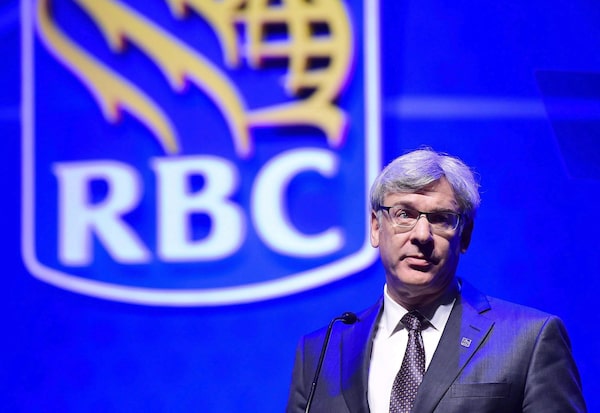
RBC chief executive Dave McKay speaks at the banks annual meeting in Toronto on April 6, 2017.Frank Gunn/The Canadian Press
Royal Bank of Canada RY-T chief executive officer Dave McKay says the lender is continuing to assess its climate change impact, responding to a parade of questions on Thursday from shareholders on the environment and Indigenous rights.
The CEO of Canada’s largest bank fielded questions at RBC’s annual meeting in Toronto after a week during which the lender closed the largest domestic bank takeover on record and ousted its chief financial officer for an undisclosed personal relationship with an employee. Shareholders at the meeting faced tightened restrictions, including a one-minute limit on questions.
Mr. McKay said the bank needs to continue to enhance its climate change strategy, but that it has also made improvements in its disclosure of environmental matters and is working with clients to adopt sustainability initiatives.
“We need to continue to evolve,” Mr. McKay said in response to a question from tribal attorney and climate advocate Tara Houska. “What we’re debating as a society is how we do that and at what pace. We know there’s urgency. We see the climate volatility and climate change.”
He added that 79 per cent of RBC’s capital markets clients in the fossil-fuel industry have a plan to transition to net-zero emissions. RBC has also committed to tripling funding for renewable energy projects.
Last week, RBC struck an agreement with New York retirement plans for the bank to publicly report the amount of its financing for clean-energy projects compared with fossil fuels. The lender was the third financial institution to agree to the proposal filed by the city’s public pension, joining New York-based banks JPMorgan Chase & Co. and Citigroup Inc.
Some shareholders expressed concerns with the new format of RBC’s annual meeting, and asked how the bank could provide participants with a more effective opportunity to express their concerns. Questions from shareholders and proxy holders were limited in length, and some were cut off if the comments did not seem to be relevant to the matter being discussed.
The change follows issues flagged by Indigenous and climate groups, as well as other shareholders, after last year’s meeting when some stakeholders said they were separated from the main meeting room by being placed into an overflow area.
“While RBC made some efforts to address the unfortunate conduct at last year’s meeting, today’s meeting had significant issues that impacted shareholders’ right to debate and discussion,” Emma Pullman, head of shareholder engagement and ESG at British Columbia General Employees’ Union, said in an e-mail statement. “Today, shareholders sent a strong message that they still find value in meeting in person. We hope RBC will consider critical improvements it can make to future meetings both virtually and in person.”
RBC chair Jacynthe Côté said the bank limited questions to one minute to allow all stakeholders an opportunity to speak, and that it will assess whether the time limit was sufficient.
“After the last AGM, we’ve been hearing voices of shareholders and we tried to do better,” Ms. Côté said in response to a shareholder question. “We’re going to continue to listen to the voices of shareholders, and hopefully we can do better next year.”
Shareholders have been raising concerns over the approach to annual meetings since companies were forced to move to virtual formats during the height of the COVID-19 pandemic. Since then, the banks have held the meetings in hybrid formats, offering both in-person and online access.
Some of Canada’s biggest banks are facing proposals from shareholders, calling on them to continue holding in-person meetings. At CIBC’s annual meeting last week, the proposal passed even after the bank recommended that shareholders reject it.
At RBC, the proposal failed, but still received significant shareholder support with 47 per cent voting in favour and 53 per cent against.
Two shareholder proposals were withdrawn from the annual meeting after RBC reached agreements on the matters in advance. Last year, RBC pivoted on a previously rejected proposal, agreeing to conduct a third-party audit of employment practices next year, and a second review of business practices in 2025.
RBC also agreed to amend its human-rights statement to include “free, prior and informed consent” and the United Nations Declaration on the Rights of Indigenous Peoples provisions that help protect Indigenous rights and include them in decision-making processes.
 Stefanie Marotta
Stefanie Marotta